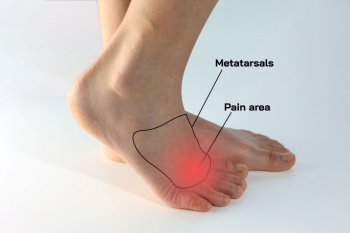
Morton's neuroma is characterized by nerve inflammation or thickening between the metatarsal bones. This condition poses significant discomfort, made worse by wearing ill-fitting shoes or high heels. People with flat feet face an elevated risk of developing Morton’s neuroma because of altered foot mechanics that increase pressure on the nerves. Symptoms of Morton's neuroma include sharp pain between toes and a burning sensation while walking or standing. Numbness, tingling, and inflammation also may be experienced. Diagnostic tools to determine the severity of Morton’s neuroma include musculoskeletal ultrasound, X-rays, and MRIs. Treatment may encompass modifying activity, taking anti-inflammatory medications, and adjusting footwear. A podiatrist may prescribe corticosteroid injections and suggest custom orthotics for additional relief. In some cases, minimally invasive surgical options to remove the neuroma may be necessary. If you are experiencing the above symptoms in the ball of the foot, it is suggested that you make an appointment with a podiatrist for an exam, diagnosis, and treatment options.
Morton’s neuroma is a very uncomfortable condition to live with. If you think you have Morton’s neuroma, contact one of our podiatrists of Summit Podiatry. Our doctors will attend to all of your foot care needs and answer any of your related questions.
Morton’s Neuroma
Morton's neuroma is a painful foot condition that commonly affects the areas between the second and third or third and fourth toe, although other areas of the foot are also susceptible. Morton’s neuroma is caused by an inflamed nerve in the foot that is being squeezed and aggravated by surrounding bones.
What Increases the Chances of Having Morton’s Neuroma?
- Ill-fitting high heels or shoes that add pressure to the toe or foot
- Jogging, running or any sport that involves constant impact to the foot
- Flat feet, bunions, and any other foot deformities
Morton’s neuroma is a very treatable condition. Orthotics and shoe inserts can often be used to alleviate the pain on the forefront of the feet. In more severe cases, corticosteroids can also be prescribed. In order to figure out the best treatment for your neuroma, it’s recommended to seek the care of a podiatrist who can diagnose your condition and provide different treatment options.
If you have any questions, please feel free to contact one of our offices located in Wilmington, Whiteville, and Wallace, NC . We offer the newest diagnostic and treatment technologies for all your foot care needs.
